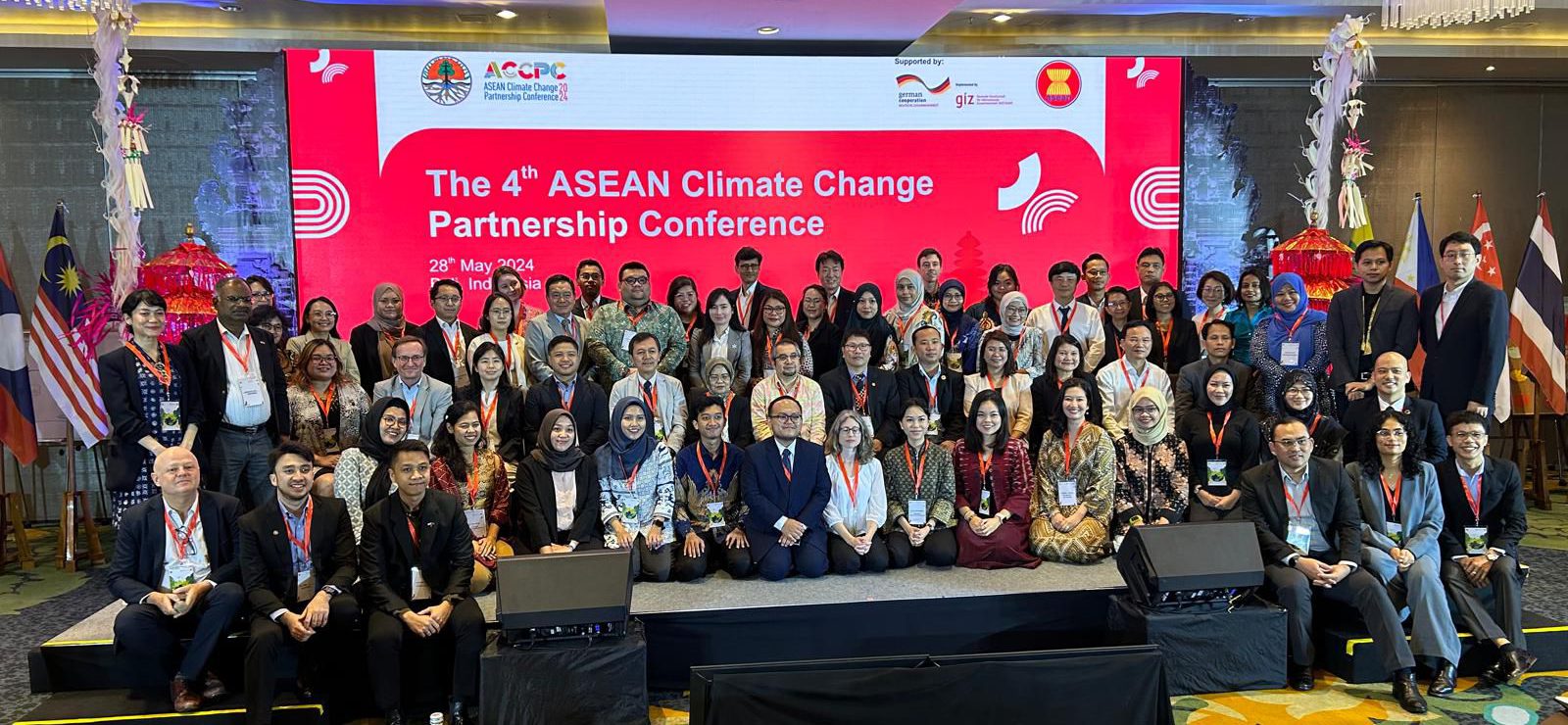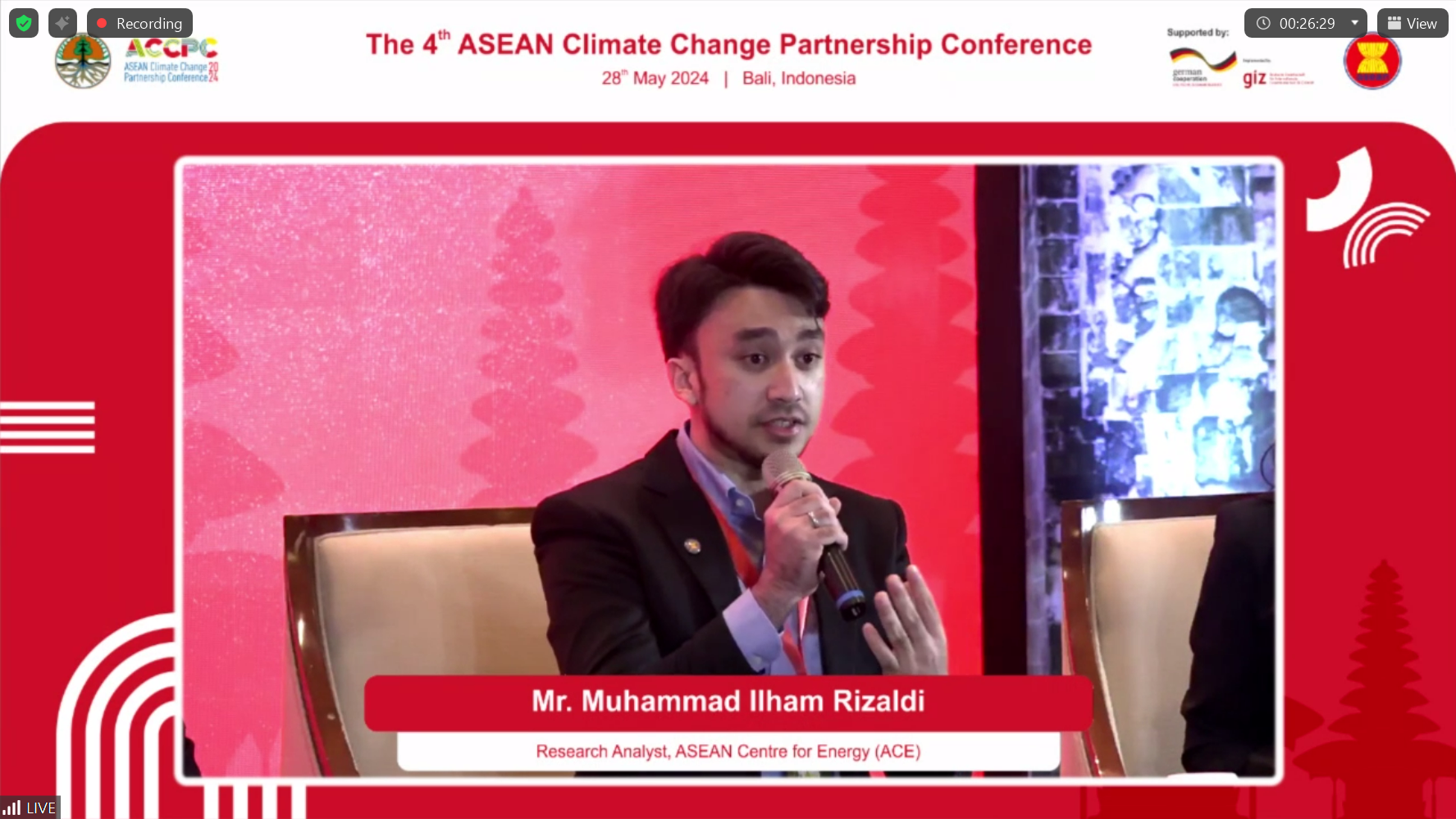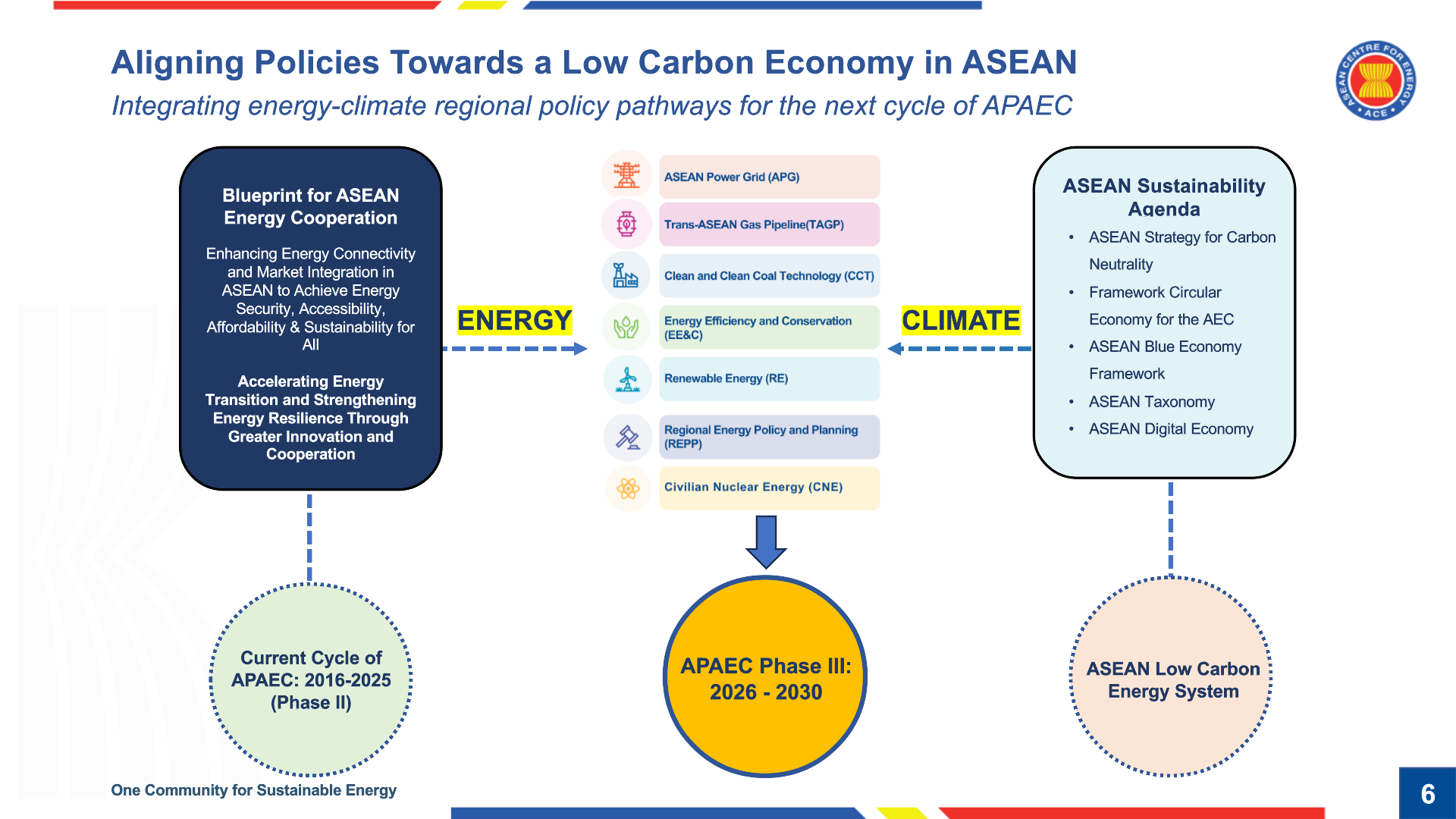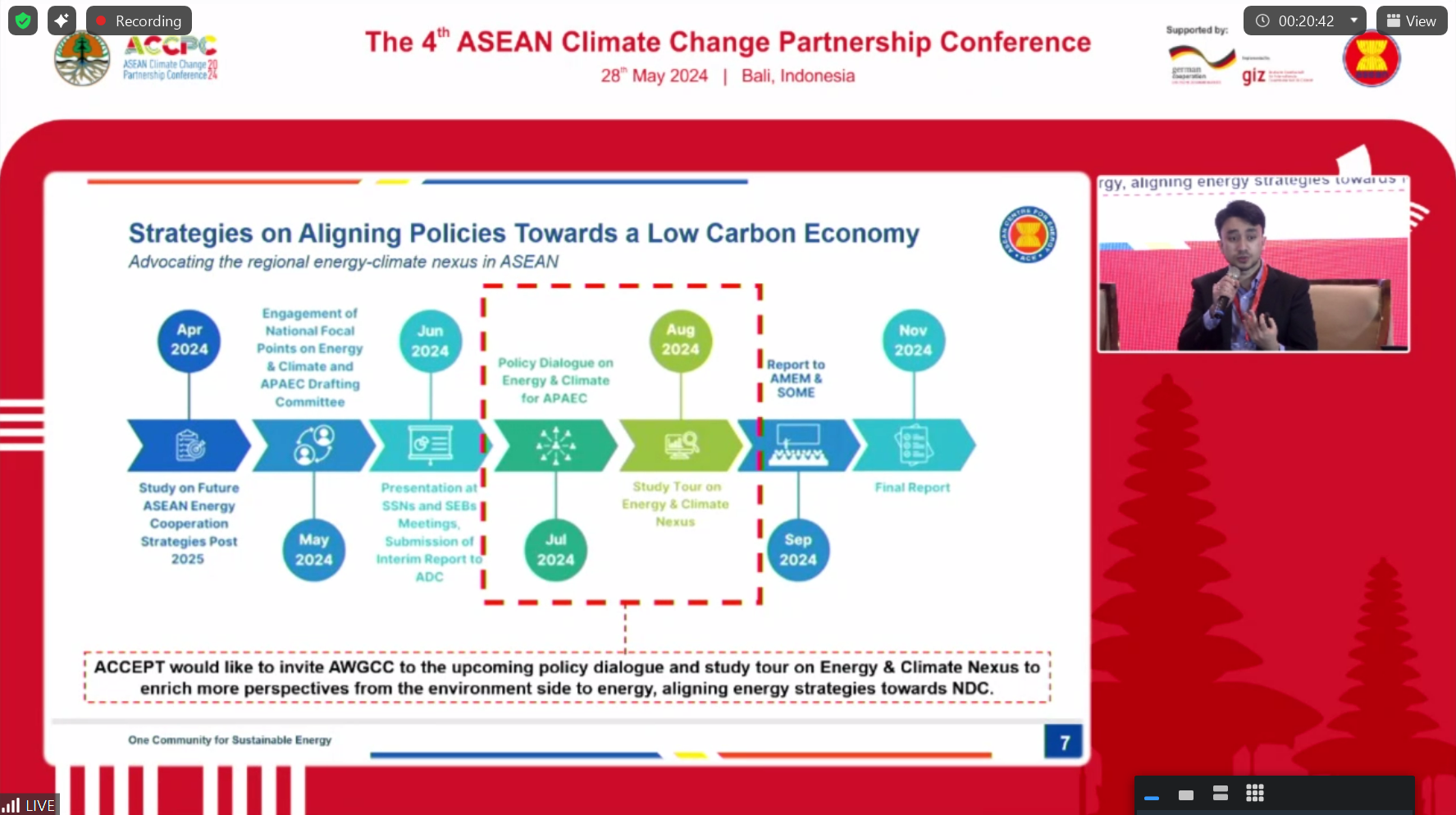i
i
Bali, 28 May 2024

Figure 1. Participants of the 4th ASEAN Climate Change Partnership Conference (ACCPC)
Every lustrum, a performance review of worldwide climate action is assessed in comparison to targets envisioned in the 2015 Paris Agreement. This is referred to as the ‘global stocktake’ where the first global stocktake (GST1) occurred during the conclusion of the latest United Nations Framework Convention on Climate Change’s Conference of the Parties (COP28). While it is disheartening to learn that the world seems to be on the course of a 2.1–2.8oC increase in global temperatures, hope is still present given that there is more abundant and accessible financial support, capacity building, and technological advancement. Combining this with the call for updating countries’ nationally determined contributions (NDCs) by 2025, creates a sense of urgency to reflect on ASEAN climate action progress and identify the way forward.
Following the dynamic pathways of climate issues, on May 28th, 2024, Muhammad Ilham Rizaldi, ACCEPT II Research Analyst represented the ASEAN Centre for Energy (ACE) at the 4th ASEAN Climate Change Partnership Conference (ACCPC) in Bali, Indonesia. The ACCPC is a multistakeholder engagement forum initiated by the ASEAN Working Group on Climate Change (AWGCC), a body under the ASEAN cooperation framework on addressing climate change. The theme of this year’s ACCPC is “Building Bridges Post-GST in ASEAN: Between Nature and Climate Ambitions”. It highlights the need to enhance the ASEAN climate target following the outcomes of GST1 in COP28 and calls for updating NDCs by 2025. On this occasion, Ilham presented the landscape of current NDC implementation in the ASEAN energy sector, along with identifying strategies to enhance energy targets for upcoming NDCs.
As a multistakeholder engagement forum, the ACCPC invited country representatives (“AWGCC National Focal Points”), ASEAN development partners, and relevant ASEAN sectoral bodies and centers to participate in the talk shows, panel discussions, and partner pitching sessions. The agenda consisted of three panel discussions and short pitching sessions from partners. The First Panel Discussion addressed the progress tracking of NDC implementation in the sectors of energy and land use, along with identifying areas for potential enhancement post-GST. Meanwhile, the Second Panel Discussion addressed ASEAN’s perspective on the operationalisation of loss and damage funds. Lastly, the Third Panel Discussion addressed ways to strengthen climate finance cooperation in the ASEAN region through increasing investments in nature and minimising the financing gap.

Figure 2. ACCEPT II Research Analyst, Ilham, during the First Panel Discussion
In this opportunity, Muhammad Ilham Rizaldi, Research Analyst of ACCEPT II was given the chance to share insights related to the energy-climate nexus in ASEAN. According to the 7th ASEAN Energy Outlook, Ilham highlighted that the power sector is expected to contribute the most to efforts on greenhouse gas (GHG) emission reductions, as it is the major contributor in most ASEAN Member States (AMS). Given the trend that shows ASEAN’s dependency on fossil fuels, it is estimated that the region will generate more greenhouse gas emissions in the years ahead.
Aligning this with ACCEPT II’s outcome on enhancing ASEAN’s capacity for a low-carbon economy towards attaining carbon neutrality (net zero), Ilham highlighted that integrating low-carbon development and energy modeling into policymaking are key elements for ensuring NDC goals implementation in the energy sector. However, he stated that the major challenge lies in balancing concerns within the energy trilemma—energy security, access, and sustainability. Six support areas were identified in which policy and regulations, as well as standards and reporting, need to be prioritised. It is essential “to integrate energy-climate objectives” in policymaking—Ilham calls, as shown in Figure 3—as consolidating these goals will significantly enhance NDC implementation.

Figure 3. ACCEPT II’s vision on integrating energy-climate nexus in ASEAN
Moving on, the strategy to align energy-climate policies can be seen from the roadmap shown in Figure 4. Following the need to renew the ASEAN Plan of Energy Cooperation (APAEC) by next year, the role of AWGCC is prominent to enhance its contribution as a “climate focal point in shaping the next ASEAN Energy Blueprint” by sharing its expertise on climate change mitigation and adaptation efforts, as well as policy development. Furthermore, a study report titled “Identifying Low Carbon Economy Strategies” will be established to be submitted to the APAEC Drafting Committee as a reference for the next cycle of APAEC.

Figure 4. Ilham outlines ACE’s strategy for aligning energy-climate policies
Further along the event, as attendees become more aware of consolidating energy-climate objectives on policymaking, several achievements and commitments showcased by ASEAN development partners can be highlighted. While almost all partners addressed their commitments to enhance capacity building and technical assistance to ASEAN, many commitments stated by numerous foreign missions to ASEAN touched upon the energy-climate nexus. Notable ones were the EU’s support in the ASEAN Centre of Excellence for Green Transition initiative; AMS partnership in renewable energy deployment with New Zealand; the Republic of Korea’s partnership in methane cooperation; and the United States’ technical assistance offers from their National Renewable Energy Laboratory (NREL). Sectoral planning and policymaking is also a prominent theme, exemplified by Australia’s support for the development of the ASEAN Strategy for Carbon Neutrality and GIZ’s ongoing knowledge-sharing workshops. Another popular notion was the commitment to climate finance, such as the United Kingdom’s numerous development funds. Concerns of just transition were also addressed as exemplified by the UN Women’s gender-responsive approach and the AICHR’s human rights emphasis. On a concluding note, enhancing collaboration in energy climate, climate finance, climate change adaptation, as well as productive engagement with partner institutions are key ingredients to formulate realistic yet enhanced NDCs. This is to support global goals of curbing emissions in a path paved by the 2015 Paris Agreement.
(SNF)
Join our ASEAN Researchers Network on Climate Change (ARNECC) by registering yourself here. Become a part of our collaborative efforts to address pressing climate challenges and shape a sustainable future.
Detailed information on ACCEPT II can be found at https://accept.aseanenergy.org/
We welcome any future collaboration, please feel free to contact us at [email protected]